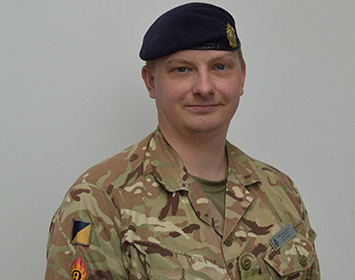Sgt Brandon Wood EngTech MIExpE
Published: 29/04/2024

 Education and qualifications:
Education and qualifications:
British Army Class 1 Ammunition Technician
Job title:
Ammunition Technician
Employer:
British Army, Royal Logistic Corps, Defence EOD, Munitions and Search Training Regiment
What/who inspired you to become an engineer?
I have always been interested in mechanics and engineering since a young age, and joining the Army and becoming an Ammunition Technician boosted that interest. To be honest, being an explosives engineer wasn’t something I ever saw myself doing, however it’s an amazing skillset to have.
Please describe your role within the workplace.
I’m currently involved in training the next generation of Ammunition Technicians. I use my vast experience to teach individuals about the technical aspects of in-service ammunition and explosives - from bullets to complex guided weapons, as well as how to store, maintain and safely dispose of them within their life cycles.
What is the most challenging aspect of your role?
The most challenging aspect is taking something that is complicated and deeply technical and presenting it in a simplified and engaging manner that allows people to understand complex concepts. After a few years in the job, you find yourself talking a different language of jargon and acronyms!
What is the most enjoyable aspect of your role?
I personally really enjoy seeing those I work with develop their technical and engineering skills on an almost daily basis. Seeing an individual start their technical journey on day one, then grow and graduate as an Ammunition Technician six months later is hugely satisfying. I also really enjoy the problem-solving aspects and finding safe, workable solutions.
What is the biggest career highlight or achievement you’re most proud of?
I was previously heavily involved in preparation of munitions in support of recent conflicts worldwide. This meant working to very tight timelines, often at very short notice, and having to find solutions to explosive safety issues, where success had a very real-world impact, beyond the engineering aspect.
Why did you choose to become professionally registered?
I chose professional registration to be formally recognised in my chosen career field. Learning my craft within the Army means that I have no academic qualifications, only military qualifications, and experience. Professional registration allowed my skills to be formalised for the future, way beyond my military service!
I would recommend professional registration because…
It opens up a whole different world of opportunity in your chosen field, from networking with other professionals, to advice and support. It also allows military personnel to gain a translatable skillset for use in the civilian world, alongside access to a network of likeminded professionals.
What career advice would you give to your younger self?
Take every opportunity offered to you! You may end up doing things you don’t enjoy so much, but it’s all part of the journey! Constantly strive to update or refresh your skillset, take each challenge as it comes, and make sure you’re recognised for your hard work.
Do you participate in mentoring, volunteering, or membership of other engineering groups?
Alongside my training commitments, I am a Professional Registration Advisor for the Institute of Explosive Engineers and provide STEM delivery to local uniformed youth organisations.





